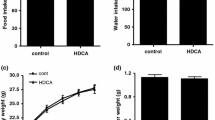Abstract
Several studies in the hamster model were undertaken to investigate known and recently disclosed metabolic interactions between bile acids and lipoproteins, particularly between ursodiol and low-density-lipoprotein (LDL) receptors. Three groups of animals, receiving a control 0.027% cholesterol diet, supplementation with 0.1% ursodiol, or supplementation with 0.1% chenodeoxycholic acid, were treated for four weeks. Both bile acids suppressed bile acid synthesis. Chenodeoxycholic acid significantly increased serum total cholesterol compared to ursodiol, and high-density-lipoprotein (HDL) cholesterol decreased significantly with chenodeoxycholic acid compared to ursodiol and control. Since the rate of bile acid synthesis is known to influence LDL receptor activity, LDL uptake under these conditions of synthesis suppression was measured. The animals received infusions of hamster LDL and methylated human LDL. Uptake of hamster LDL (occurring by both receptor-dependent and receptor-independent mechanisms) was significantly higher in the ursodiol-treated group than in the others. Human LDL uptake (occurring only by receptor-independent mechanisms) was not significantly affected by either treatment. The mechanisms by which ursodiol apparently directly stimulates the LDL receptor remain speculative but may involve alteration of cell membrane fluidity, change in the rate of LDL receptor cycling, and increase in the number of LDL receptors.
Similar content being viewed by others
References
Brown MS, Goldstein JL: Lipoprotein receptors in the liver: Control signals for plasma cholesterol traffic. J Clin Invest 743-747, 1983
Kesaniemi YA, Grundy SM: Significance of low density lipoprotein production in the regulation of plasma cholesterol level in man. J Clin Invest 70:13–22, 1982
Brown MS, Goldstein JL: A receptor-mediated pathway for cholesterol homeostasis. Science 232:34–47, 1986
Shepherd J, Packard CJ, Bicker S, Lawrie TDV, Morgan HG: Cholestyramine promotes receptor mediated low density lipoprotein catabolism. N Engl J Med 302:1219–1222, 1980
Salvioli G, Lugli R, Pradelli JM, Gigliotti G: Bile acid binding in plasma: The importance of lipoproteins. FEBS Lett 187:272–276, 1985
Malavolti M, Fromm H, Ceryak S, Shehan KL: Interaction of potentially toxic bile acids with human plasma proteins: Binding of lithocholic (3α-hydroxy-5β-cholan-24-oic) acid to lipoproteins and albumin. Lipids 24:673–676, 1989
Malavolti M, Fromm H, Ceryak S, Roberts IM: Modulation of low density lipoprotein receptor activity by bile acids: Differential effects of chenodeoxycholic and ursodeoxycholic acids in the hamster. J Lipid Res 28:1281–1295, 1987
Malavolti M, Ceryak S, Fromm H: Modulation of bile secretion by hepatic low-density lipoprotein uptake and by chenodeoxycholic acid and ursodeoxycholic acid treatment in the hamster. Gastroenterology 93:1104–1115, 1987
Nilsell K, Angelin B, Leijd B, Einarsson K: Comparative effects of ursodeoxycholic acid and chenodeoxycholic acid on bile acid kinetics and biliary lipid secretion in man. Evidence for different modes of action on bile acid synthesis. Gastroenterology 85:1248–1256, 1983
Hardison WGM, Grundy SM: The effect of ursodeoxycholate and its taurine conjugate on bile acid synthesis and cholesterol absorption. Gastroenterology 87:130–135, 1984
von Bergmann K, Epple-Gutsfeld M, Leiss O: Differences in the effects of chenodeoxycholic and ursodeoxycholic acids on biliary lipid secretion and bile acid synthesis in patients with gallstones. Gastroenterology 87:136–143, 1984
Author information
Authors and Affiliations
Rights and permissions
About this article
Cite this article
Fromm, H. Bile acid-lipoprotein interactions. Digest Dis Sci 34 (Suppl 12), S21–S23 (1989). https://doi.org/10.1007/BF01536658
Received:
Accepted:
Issue Date:
DOI: https://doi.org/10.1007/BF01536658




